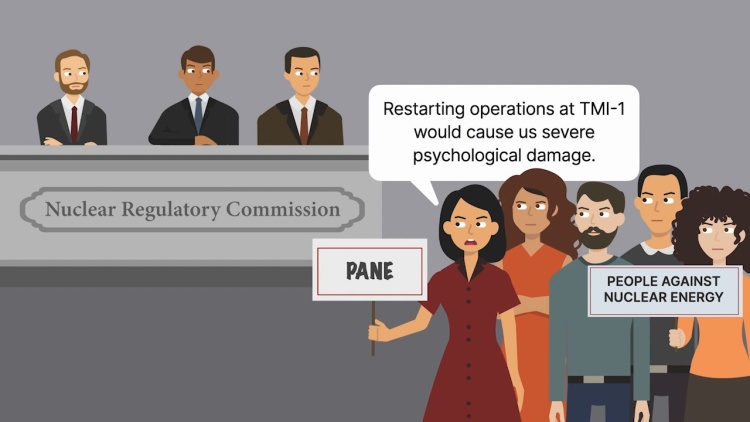Metropolitan Edison Co. v. People Against Nuclear Energy
United States Supreme Court
460 U.S. 766 (1983)
- Written by Robert Cane, JD
Facts
Both Three Mile Island Unit 1 nuclear power plant (TMI-1) and Three Mile Island Unit 2 (TMI-2) were nuclear power plants licensed by the Nuclear Regulatory Commission (NRC) (defendant). When TMI-2 suffered a serious accident while TMI-1 was shut down for refueling, the NRC ordered Metropolitan Edison Company (Metropolitan) (defendant) to keep TMI-1 shut down until the NRC conducted a hearing to consider several safety-related issues. The NRC published a notice of hearing regarding TMI-1 safety issues. People Against Nuclear Energy (PANE) (plaintiff) intervened in the hearing. PANE was a group of residents who opposed the operation of Three Mile Island’s reactors. PANE asserted that restarting TMI-1 would cause severe psychological damage to persons living nearby due to concerns over the risk of a nuclear accident. The NRC had prepared an environmental-impact statement (EIS) prior to granting operating licenses to Three Mile Island. The EIS contained information on the release of low-level radiation, increased fog, the risk of a nuclear accident, and other effects of operation of TMI-1. The NRC also prepared an environmental-impact assessment (EIA) considering the same. The NRC determined that the psychological harm due to the risk a nuclear accident was too attenuated to require extensive review. The NRC approved renewed operation of TMI-1. PANE sought review of the NRC’s decision in the United States Court of Appeals for the District of Columbia Circuit. The court of appeals held that the NRC’s failure to consider the potential harm to the psychological health of residents caused by the risk of a nuclear accident violated the National Environmental Policy Act (NEPA). Metropolitan and the NRC appealed to the United States Supreme Court.
Rule of Law
Issue
Holding and Reasoning (Rehnquist, J.)
What to do next…
Here's why 907,000 law students have relied on our case briefs:
- Written by law professors and practitioners, not other law students. 47,100 briefs, keyed to 996 casebooks. Top-notch customer support.
- The right amount of information, includes the facts, issues, rule of law, holding and reasoning, and any concurrences and dissents.
- Access in your classes, works on your mobile and tablet. Massive library of related video lessons and high quality multiple-choice questions.
- Easy to use, uniform format for every case brief. Written in plain English, not in legalese. Our briefs summarize and simplify; they don’t just repeat the court’s language.





